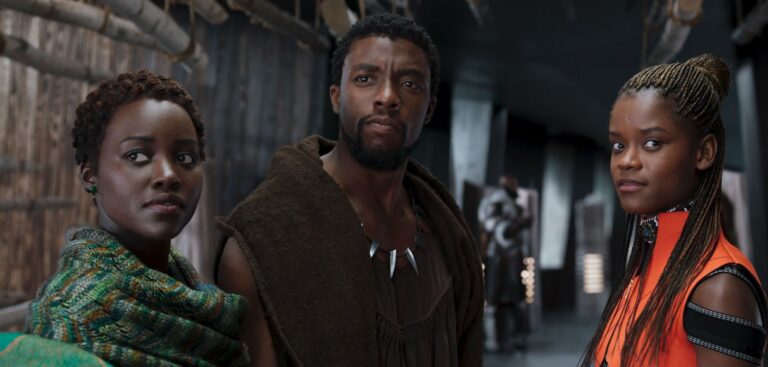Despite the overwhelming success of the Marvel Cinematic Universe (a collective gross of more than $5 billion domestically), the studio has oft been criticized for a lack of diversity in their films. The majority of Marvel’s heroes have been white males, with characters of other ethnicities and sexes typically relegated to supporting roles (Scarlett Johansson’s Black Widow, Don Cheadle’s War Machine, Idris Elba’s Heimdall, etc). The character of Black Panther, whose popularity has been consistent since his comic debut in 1966, didn’t make it to the big screen until Captain America: Civil War – a travesty, to be sure – and Chadwick Boseman’s scene-stealing performance left audiences begging for more adventures from the Wakandan monarch.
As the 18th entry in the MCU, Black Panther represents a watershed moment in the film industry: not only is it the first superhero film headlined by a black actor in nearly a decade (Will Smith’s Hancock, while not based on a recognizable comic book character, was released in 2008), it’s also the first film in the modern era of blockbuster superhero tentpoles that features a predominantly black cast, not to mention an aesthetic heavily influenced by African culture. Very little about Black Panther looks like the sort of film that we’ve come to expect from Marvel, and with analysts forecasting a staggering $160 million opening this weekend, it’s clear that something is resonating with audiences.

Of course, none of this would matter if the film turned out to be a dud. But with Creed director Ryan Coogler at the helm and some jaw-dropping cinematography from Mudbound‘s Rachel Morrison, Black Panther is a cut above the rest, a unique and original vision that could mark the dawn of a new era in studio filmmaking. It’s also one of the MCU’s best entries yet, a remarkably entertaining superhero origin story that not only pays homage to the roots of its character and culture, but expertly blends the material with an especially relevant social and political message.
The film opens with a gorgeously animated sequence relating the history of Wakanda, the site of a meteorite crash that introduced the local tribes to vibranium, an incredibly powerful and versatile element which led to significant advances in technology. The five tribes made a pact to keep the material hidden from the outside world, lest more powerful nations attempt to strip Wakanda of its resources for their own gain – thus, while the outside world sees them as nothing more than a third-world country populated by farmers, the truth is that Wakanda has long since outpaced the rest of the world in medicine, intelligence and defense.
Returning home after the death of his father, T’Challa (Boseman) ascends to the throne after a grueling combat ritual against the leader of a rival tribe (Winston Duke). His first act as the newly crowned King of Wakanda is to hunt down Ulysses Klaue (a gleefully vicious Andy Serkis), a South African arms dealer who infiltrated the country several decades earlier, absconding with a shipment of vibranium that he’s been using to manufacture weapons. When covert intelligence reveals that Klaue has acquired an ancient Wakandan artifact that he intends to sell on the black market, T’Challa and his loyal general Okoye (Danai Gurira) move to intercept the sale, running afoul of CIA operative Everett Ross (Martin Freeman) and triggering a thrilling fight sequence set against the backdrop of an underground South Korean casino.

But as sadistic as Klaue may be, he can’t match the lethality of his accomplice, Erik Killmonger (Michael B. Jordan), a former soldier of fortune whose shadowy past is linked inextricably to Wakanda – and the throne itself. Killmonger’s personal vendetta against T’Challa and the other Wakanda tribes creates something of a rarity for a Marvel film, a villain with real depth, whose motivations are clear and whose heinous crimes are rooted in something more than just a generic desire for power. Jordan is excellent here, a swaggering, cocksure portrait of seething rage, and every bit as captivating as his previous collaborations with Coogler.
Even more compelling, however, is the film’s treatment of its female characters – another area where Marvel has fallen short in the past. Last year’s Wonder Woman was lauded for its depiction of Amazonian warriors, but the badass women of Black Panther are more than willing to give the residents of Themyscira a run for their money. The aforementioned Okoye leads the Dora Milaje, an elite detachment of spear-wielding female warriors pledged to defend the Wakandan throne, and watching them spring into battle during the film’s climactic assault – dispatching their male counterparts with relative ease – is truly a sight to behold.

Elsewhere, T’Challa’s former love interest Nakia (Lupita Nyong’o) and younger sister Shuri (Letitia Wright) are fighters in their own right, with the former rescuing subjugated women from warlords that control nearby countries, and the latter responsible for the technological achievements that created her brother’s bulletproof suit and vast arsenal of weaponry – not to mention the intricate railway system that connects Wakanda itself. Shuri can best be compared to the Bond franchise’s Q, if the character was a whip-smart teenager with twice the intelligence and a pair of panther-shaped gauntlets that fired laser blasts.
At 134 minutes, Black Panther‘s running time flirts dangerously close to feeling excessive, but even when things start to lag, it’s nearly impossible not to get lost in the visuals. From the shimmering gold bands and bright crimson uniforms of the Dora Milaje to the animal skins and skulls worn by the Jabari tribe, from the glittering steel and glass skyscrapers of the Wakandan capital to the brilliant sunsets over the sprawling African plains, there’s beauty to be found in every frame. Already a visionary director, Coogler has outdone himself with a film that fits into the larger Marvel universe while retaining a sense of confidence and identity all its own. Black Panther deserves every bit of the hype surrounding its release, and then some.

